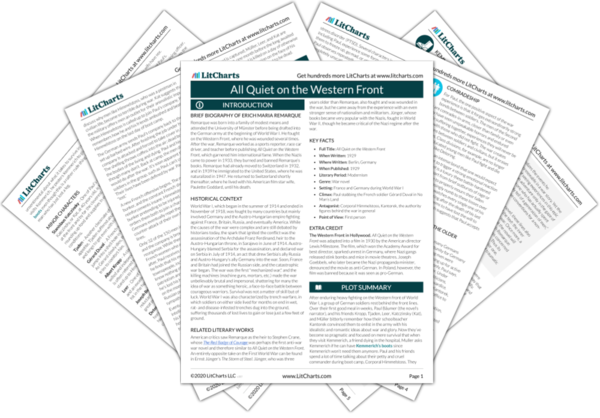When war broke out in 1914, many Germans viewed the conflict as an opportunity for Germany to prove her superior military strength. Young men were expected to support the national cause by signing up for active duty. These soldiers were volunteers in theory only, Paul says. The reality was that most had no say in the matter. Under immense pressure from parents, teachers, and politicians, young men had to enlist or risk being accused of cowardice. One of Paul’s teachers, a patriotic older man named Kantorek, even marched his class down to the local recruitment office to volunteer.
Paul feels that these authority figures deceived his generation, filling their heads with romantic ideas about patriotism but failing to prepare them for the horrors of battle. He is disgusted by the hypocrisy of those who preach the virtues of sacrifice, yet are content to let other men die in their place. Even when it has become obvious that Germany cannot win, those in power stubbornly prolong the war, blinded by greed and pride.
The Hypocrisy of the Older Generation ThemeTracker

The Hypocrisy of the Older Generation Quotes in All Quiet on the Western Front
There were thousands of Kantoreks, all of whom were convinced that they were acting for the best—in a way that cost them nothing. And that is why they let us down so badly. For us lads of eighteen they ought to have been mediators and guides to the world of maturity, the world of work, of duty, of culture, of progress—to the future…The idea of authority, which they represented, was associated in our minds with a greater insight and a more humane wisdom. But the first death we saw shattered this belief. We had to recognize that our generation was more to be trusted than theirs.
Iron Youth. Youth! We are none of us more than twenty years old. But young? Youth? That is long ago. We are old folk.
On the platform I look round; I know no one among all the people hurrying to and fro. A red-cross sister offers me something to drink. I turn away, she smiles at me too foolishly, so obsessed with her own importance: "Just look, I am giving a soldier coffee!"—She calls me "Comrade," but I will have none of it.
I am frightened: I dare think this way no more. This way lies the abyss. It is not now the time but I will not lose these thoughts, I will keep them, shut them away until the war is ended. My heart beats fast: this is the aim, the great, the sole aim, that I have thought of in the trenches; that I have looked for as the only possibility of existence after this annihilation of all human feeling; this is a task that will make life afterward worthy of these hideous years.











